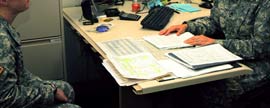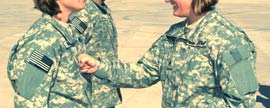Excellent question. AR 600-9 is very specific it states:
Paragraph 3-6
b. Soldier Action Plan.Within 14 days of the notification counseling, the Soldier will respond to the commander with a Soldier Action Plan confirming that he or she has read USAPHC TG 358, provide date and time of scheduled nutrition counseling, and indicate what approach he or she intends to use to work towards meeting the body fatstandard. As a part of the Soldier Action Plan, the Soldier must complete the Army MOVE!23 (http://usaphcapps.amedd.army.mil/move23/register.asp) interactive questionnaire, review the survey results, and record the retrieval code
Soldier will be advised they- (2)(a) Must read the USAPHC TG 358 within 14 days of enrollment. An appointment with a dietitian is optional at the Soldier’s own expense (3)b: Soldier Action Plan. At the next scheduled MUTA following ABCP enrollment notification counseling, Soldiers will respond to the commander with a Soldier Action Plan confirming that they have read USAPHC TG 358.
Table 3-1
Indicates the following actions are Mandatory:Read USAPHC TG 358 and complete Army MOVE!23 Questionnaire
a. having the Soldier complete all the requirements to as specified in AR 600-9 to standard.
b. you could also consider having the Soldier write an essay about the impact and consequences of disobeying an order or regulation,
c. you could have the Soldier prepare a class on disobeying an order and/or regulation.
d. as additional corrective action you could consider having the Soldier write an SOP on ABCP and develop a checklist of the actions that need to be taken to ensure Soldiers are in compliance with AR 600-9.
e. the Commander could also consider making the Soldier responsible for certain parts of the ABCP program by giving them an Additional Duty Appointment order such as ABCP monitor or some other duty that requires them to become familiar with the program and be responsible for checking the aspects of the program they refused to comply with. This may or may not be appropriate depending on the specifics of the incident and the rank of the Soldier.
f. another possibility is to recommend to the Commander that certain privileges be revoked during drill periods. For example: to ensure the Soldier completes the requirements that they have previously refused to do, the Commander could consider revoking: the Soldier’s pass privileges (ability to leave the Armory (or other specified area) during drill, revocation of visitation, phone, MWR, alcohol, tabacco (in this case things that would distract the Soldier from completing the task) or other privileges that might be appropriate. The Commander should check with JAG/IG before revoking privileges just to make sure they have the support of JAG/IG.
4. Depending on the severity of this issue and if the Soldier has other significant behavioral issues the Commander could consider disqualifying the current period of service for the Soldier’s Good Conduct Medal.













